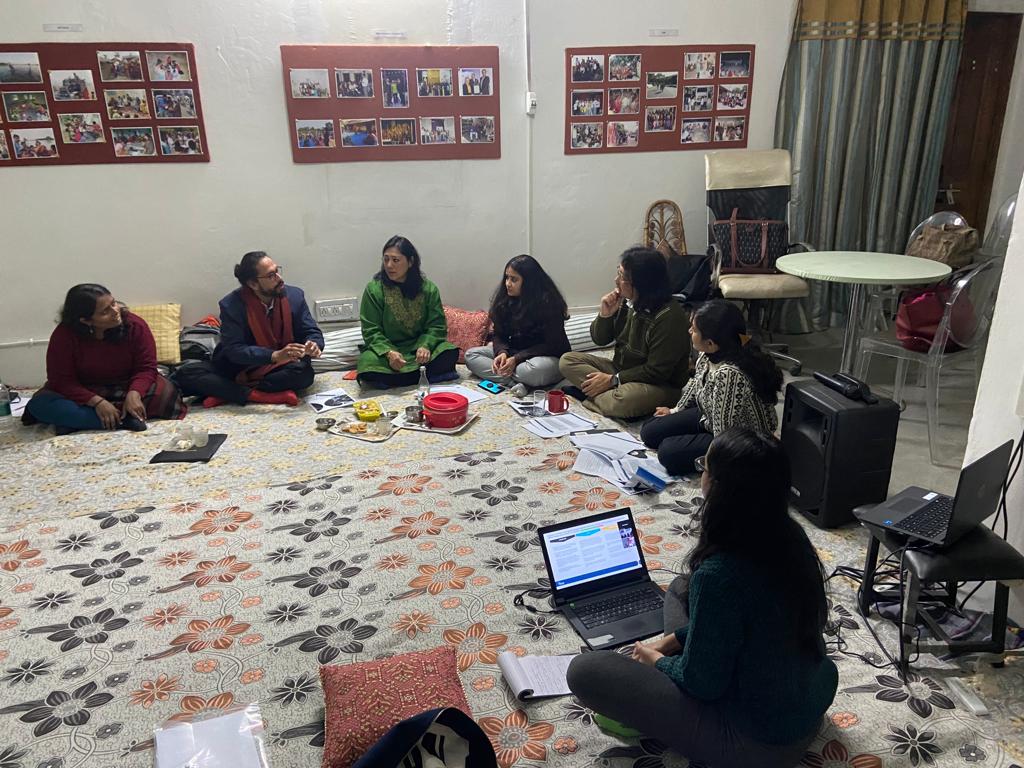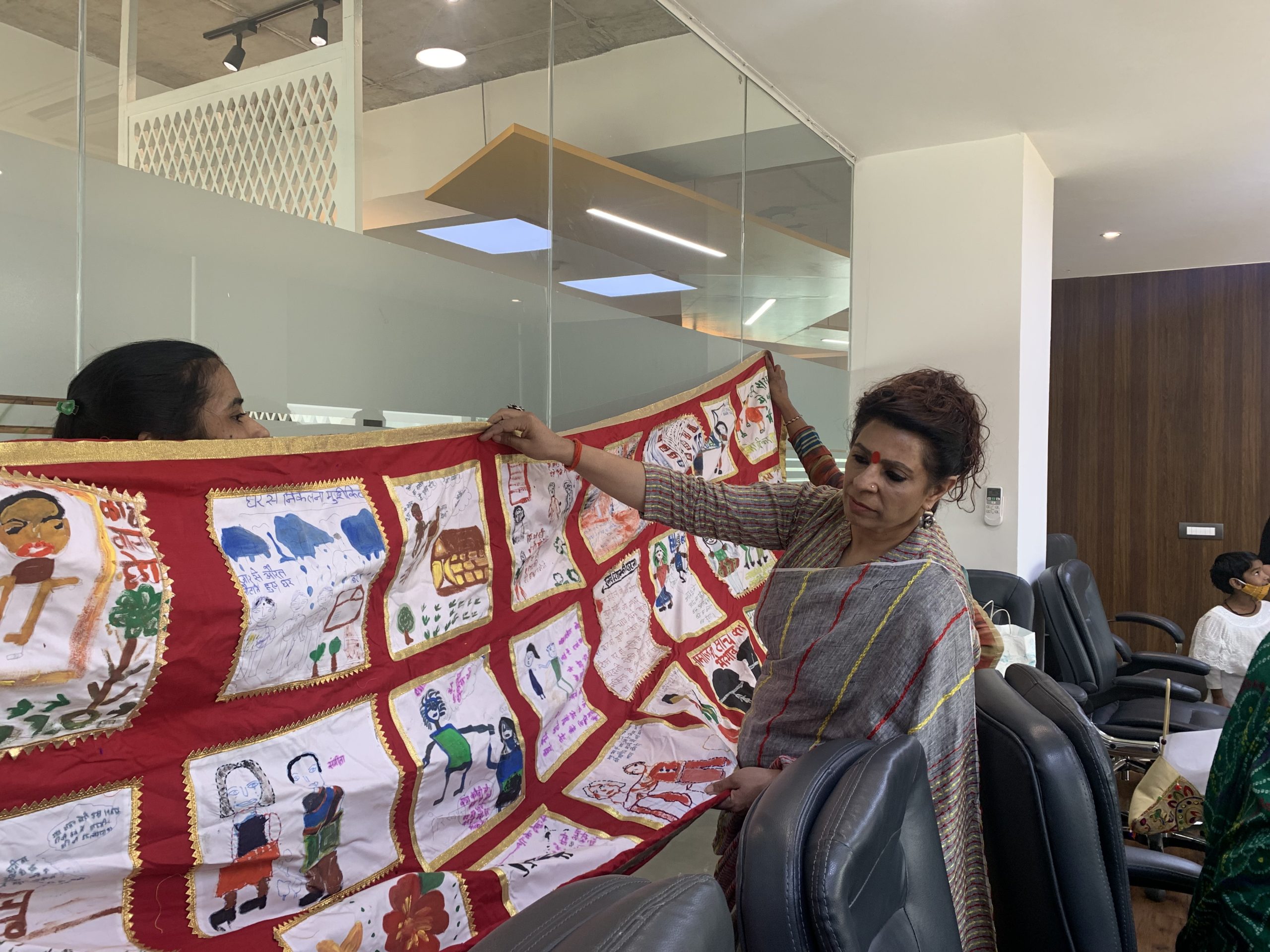Regardless of being set to be the world’s fastest-growing financial system, India performs poorly when it comes to girls’s security and gender equality. Nandita Pradhan Bhatt believes that gender-based violence and discrimination wants behavioural and attitudinal change. Guaranteeing dignity and security on the office, particularly for home employees is crucial to the work that she has been doing over time.
Nandita Pradhan Bhatt, Director of the Martha Farrell Basis
Nandita Pradhan Bhatt is the Director of the Martha Farrell Basis, which has been working with a gender, fairness, range, and inclusion lens since its inception in 2015, with the intention of stopping sexual harassment within the office. On the sidelines of Dasra Philanthropy Week, 2023, I had the chance to have an in depth dialog with Nandita on how Dasra’s Rebuild India Fund represents a brand new and much-needed mannequin of giving in India whereas digging deep into how the Martha Farrell Basis is fulfilling its dedication to making sure gender justice.
Aarti Mohan: As an Funding Committee Member of the Rebuild India Fund, are you able to inform us a bit bit extra about it and what makes it distinctive in the way in which that it’s driving the resilience of grassroots organisations?
Nandita Pradhan Bhatt: The Rebuild India Fund is a unbelievable fund that Dasra has, which helps very small grassroots organisations with versatile and unrestricted funding, which is a novelty. The concept is to assist the agility that grassroots organisations have already got, as was demonstrated throughout Covid, after they swiftly took up reduction work with their very own cash. The Rebuild India Fund not solely permits for this agility but in addition allows establishments to focus on ‘constructing’ their establishments.
Throughout COVID, we realised the ability of ‘no questions requested’ funding.
There’s a detailed wants evaluation on what really every grassroots organisation wants. It’s altering the way in which philanthropy is completed by shifting the ability dynamics and creating an equal taking part in area for organisations creating on-ground impression. The Fund, uniquely, asks questions in regards to the wellness of the organisations, the management and the individuals working inside it, and there’s assist given for wellbeing. There may be additionally a change within the atmosphere from one among competitiveness to that of collaboration.

Picture courtesy of the Rebuild India Fund, Dasra
On the coronary heart of trust-based philanthropy is the accountability from each the funder and the grassroots organisation. In that context, is there an understanding of what this unrestricted versatile funding is being spent on? And do you see a behavioural sample within the funders who’re able to fund this, when it comes to what helps them construct this belief?
The Rebuild India Fund has allowed grassroots organisations to experiment and conduct pilots for options that couldn’t be executed earlier due to an absence of funds. Many are spending on capability constructing, setting processes and techniques in place, recruiting good expertise for communication, fundraising and human useful resource administration, and a few are utilizing it to unfold the motion of their work for elevated collaboration. Dasra is the binding drive between all people. As a result of the Rebuild India Fund is a pool of assets that funds a number of organisations, and so the belief of funders is in Dasra.
Throughout Covid, we realised the ability of ‘no questions requested’ funding. With assist from Dasra, we developed an distinctive reduction mannequin that empowered home employees, who had misplaced their livelihood and have been additionally extremely weak to abuse, to obtain the funding and design programmes tailor-made to their necessities. Consequently, the communities got here out a lot stronger.
How was the expertise on the Dasra Philanthropy Week, particularly because it came about in individual after two years?
The expertise was very fascinating and fascinating. We have been busy in a number of periods, and the Rebuild India Fund initiatives have been additionally occurring the place the primary and second cohorts have been assembly. There was range within the stakeholders that have been current, there have been extra implementing companions and likewise of various regional languages. The Dasra Philanthropy Week allowed a protected place for civil society practitioners to take conversations ahead in direction of the identical motion and trigger that everybody is part of.
It’s been fascinating for us to have a look at the main focus areas and approaches that the Martha Farrell Basis takes, so we’d like to know extra about Martha Farrell Basis’s work in India. How lengthy have you ever been in India and the way has the journey been?
Martha Farrell, the previous director of Participatory Analysis in Asia (PRIA), was a gender equality chief. When she died in a terrorist assault in 2015, Dr Rajesh Tandon, PRIA’s Founder-President, established the Martha Farrell Basis in her honour. I assumed the management on the basis to hold on Farrell’s work, with a deal with stopping gender-based violence and selling gender equality, particularly amongst younger individuals by way of the programme ‘Kadam Badhate Chalo’. This programme makes use of participatory analysis methodologies to empower younger leaders and advocate for gender equality.
One other necessary step on this route, which the Rebuild India Fund has enabled us to check, is to create a protected place for conversations with boys and males, and never from a perpetrator lens however to actually hearken to them and their psychological well being challenges. We’re specializing in prevention of violence and discrimination by way of behavioural change.
The opposite programme is named ‘Making Workplaces Protected’ which is about gender mainstreaming, gender audits and prevention of gender-based violence in numerous establishments, together with company workplaces, tutorial establishments, and casual workplaces. We additionally work with the district and state authorities to determine techniques underneath The Safety of Girls from Sexual Harassment at Office Act, 2013, similar to establishing Native Complaints Committee (LCC) to deal with sexual harassment complaints in opposition to employers, particularly by girls within the casual sector. We additionally prepare the inner committees of formal organisations to take a survivor-centred and trauma-informed method in coping with girls. We now have a particular deal with home employees who’re amongst probably the most weak and marginalised teams with little area to barter for dignity and security on the office.

Picture courtesy of the Martha Farrell Basis
One other necessary step on this route, which the Rebuild India Fund has enabled us to check, is to create a protected place for conversations with boys and males, and never from a perpetrator lens however to actually hearken to them and their psychological well being challenges. We’re specializing in the prevention of violence and discrimination by way of behavioural change.
It’s very fascinating to listen to about these protected areas for males and boys, as a result of it is a bigger dialog that I’ve been listening to as effectively. How do you ensure that all of those totally different threads are tied collectively within the work that you just do?
We tie all of the threads collectively. For instance: Throughout the Covid-19 pandemic, violence in opposition to casual working girls was notably excessive in city settlements. To deal with this concern, bodily protected areas have been established the place girls might come, sit, and discuss with each other, facilitated by different girls. We introduced collectively our programmes ‘Kadam Badhate Chalo’, ‘Dignity at Work’, and ‘Making Workplaces Protected’ in these centres. Consequently, girls additionally got here collectively to kind small companies and known as them ‘Swabhiman Kendras’. The ladies additionally began coming collectively to rejoice festivals and have enjoyable collectively. Girls started realising the significance of their voices and talking their minds, and the youngsters of their properties supported them. Even in our conversations with the corporates we discuss properties as workplaces and sensitise them about home employees. In our gender coaching, we create protected locations for males and boys as effectively.

Picture courtesy of the Martha Farrell Basis
Institutional accountability is essential and is a giant focus for us. Participatory analysis is the core methodology we comply with, which is community-centric in nature. We additionally ideate with our communities to grasp their wants. We additionally collaborate quite a bit to carry wide-scale change.
In mild of what you’ve shared, I’m fascinated with understanding the method to grantmaking, similar to who to work with, timelines for work, and grant construction. How do you deal with such deep-seated biases?
The Rebuild Fund permits us the flexibleness to experiment and select the programmes that we need to take ahead. The Fund’s funding committee identifies credible organisations that align with sure standards, similar to being small, led by proximate leaders, community-driven and serving weak communities. A call is made primarily based on these elements.
The Rebuild India Fund not solely permits for this agility but in addition allows establishments to focus on ‘constructing’ their establishments.
We really feel that this work isn’t going to finish, and we now have been engaged on it for years, however it nonetheless exists. We don’t take a top-down method to fixing the difficulty of violence and ensure it’s neighborhood pushed and owned. We construct capability and management inside the neighborhood to take this work ahead, and solely then transfer forward.
Trying forward when it comes to the Martha Farrell Basis’s work and portfolio in India, what are the areas that you’re wanting ahead to? Are there going to be any new areas of labor?
Our organisation is exploring the opportunity of increasing our work to Nepal the place there’s a regulation on sexual harassment within the office however it isn’t being enforced, and we intention to introduce our profitable mannequin from India. Though our major focus will stay on addressing gender-based violence and discrimination, we intend to collaborate with extra companions and share our methodology, together with the Kadam Badhate Chalo mannequin, which empowers younger individuals to take possession of defining gender points in their very own context and language and discovering research-based options for his or her communities. Girls’s issues of safety have turn into an necessary matter within the G20 conferences as effectively.
Aarti Mohan is the South Asia Regional Consultant at Alliance journal.

Credit score:Source link




